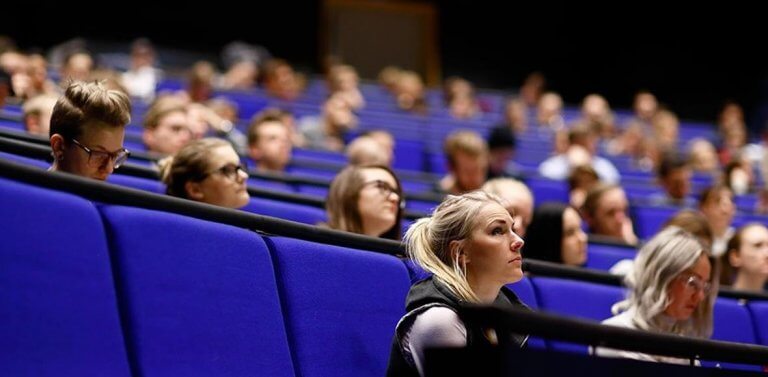
“LiU has many student organisations with lots of events for networking. You can find something to do every week.” – Fabio Siliberto, MSc student, Linköping University
Since becoming a university in 1975, Linköping University (LiU) has constantly developed and invested in its campus grounds to create a dynamic, global and future-oriented learning community. LiU is a known innovator; an established pioneer of new programmes that consider society’s changing needs.
Now, the institution serves as home to a diverse student body of 27,000, also playing host to 4,000 dedicated members of staff. In the past five years, the university has fed every effort into climbing the coveted rankings, and now stands 28th among the world’s Top 50 Universities under 50 years old – the only Swedish institution to make this year’s league table.
Established in the quaint Swedish cites of Linköping and Norrköping, this university seamlessly blends rich culture with the infectious buzz of an up-and-coming tech hub. Set a mere two-hour drive from the capital of Stockholm, students here build a life that’s vibrant and safe, but also highly connected.

This visionary education provider is spread across four campuses in three progressive cities – Campus Valla, University Hospital Campus and Campus Norrköping. All come complete with state-of-the-art resources, including auditoriums, labs, the Clinicum for clinical skill practice, workshops, and nearby external research facilities, such as the National Supercomputer Centre; not to mention an extensive portfolio of 26 future-oriented master’s programmes.
Linköping University’s research triumphs are enhanced by a broad topic approach and a ‘lack of boundaries’ between faculty and schools. But LiU also explores Strategic Research Areas, impacting the world through an emphasis on business, governance and industry in fields such as Materials Sciences and Security Management. LiU students benefit from access to top-class resources, on top of labs devoted to the execution of ‘research that makes a difference’.
This research-based institution has built a steady reputation for academic innovation and cross-disciplinary studies, empowering students through career-focused education that’s nothing short of world-class. Rooted in the notion that learners should develop their own ideas critically and independently, students leave ready to make waves in a complex modern world. At LiU, learners feel enlivened by creativity and experimentation, finishing as versatile, accomplished and proud global graduates.
“You will be part of a university that is constantly pushing boundaries and thinking of new ways to approach education and research,” says Vice-Chancellor, Helen Dannetun.
“In the same spirit, the university offers many innovative educational programmes, many of them with a clear vocational focus,” Dannetun explains.
World-leading programmes; from Aeronautical Engineering to Sustainable Development
Particularly renowned for its applied science degrees; cross-disciplinary courses that benefit the wider world. The two-year MSc in Science for Sustainable Development is the prime example, preparing you to solve real-world problems and build a sustainable future.

Students will have the chance to gain a multidisciplinary understanding of issues surrounding sustainable development, as well as an awareness of their real-world application. Here, you’ll gain knowledge that’s current and industry-informed. It’s an education that instils a competitive edge in an incredibly vibrant context, making you incredibly attractive to the modern recruiting employer.
“The courses cover a broad range of topics – from climate change and biodiversity loss to feminism and colonisation. Also, the students are from all over the world – it’s not only fun to be exposed to such a huge diversity of cultures, but in the class, it actually feels like a global cooperation in tackling these issues,” says Karolina Gurjazkaite, student of the course.
The MSc in Computational Social Science is another of LiU’s revered programme offerings, allowing students to decode society and human behaviour. The programme’s theoretical and substantive modules introduce the concept of social inquiry and theories of human behaviour. From here, you will apply your technical expertise to pressing social issues such as ethnic segregation in schools, income inequality, entrepreneurship, political change, and cultural diffusion.
To meet the global demand for pioneering education, LiU offers a range of Master’s programmes with English language instruction. All courses within the 26 Master’s programmes that are delivered in English attracts both domestic and international students.
One of Sweden’s largest higher engineering institutions
Future engineers and scientists must possess sound problem-solving skills, and strive to understand the far-reaching impact of technological solutions.
Ranked Sweden’s second-best provider of engineering and computing education, LiU’s Institute of Technology provides career-focused training for 9,000 aspiring technical professionals. Powered by a faculty of more than 1,000 employees and a research budget that exceeds one billion kronor, this fully-integrated LiU faculty is both high-quality and cutting-edge.

The Institute is formed of seven leading departments, including Biomedical Engineering, Computer and Information Science, Electrical Engineering and Management and Engineering. It awards BSc, MSc and PhD degrees, the main focus being on advanced engineering and computer science programmes that lead to a Master’s degree.
“We look forward to your contributions to our dynamic learning environment,” Dannetun concludes. “For us, internationalisation is a quest for quality.
“By having talented and ambitious students from around the globe sharing your culture, experiences and unique perspectives – we all grow.”
Follow Linköping University on Facebook, Instagram, WeChat, Weibo and LinkedIn
Liked this? Then you’ll love these…
Find your niche at Linköping University
Leading European Universities for Research, Teaching and Innovation







